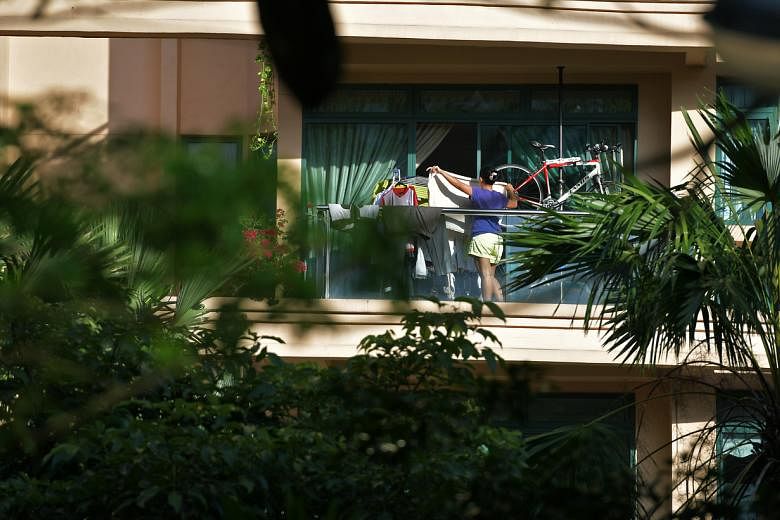SINGAPORE - Employers will be required to give their domestic workers one compulsory day off each month that cannot be compensated with cash, under new rules that will take effect by the end of next year.
The Ministry of Manpower (MOM) announced new measures to strengthen support for migrant domestic workers on Thursday (July 22).
New maids will also be interviewed twice in their first year of work by the Centre for Domestic Employees (CDE), and undergo checks by employment agencies after their placement.
This is to ensure the maids and their employers settle into their working relationship, as well as raise and resolve issues. This will be done by the end of this year.
To facilitate the interviews, MOM will set up three neighbourhood centres in partnership with the CDE, with the first centre targeted to open by the first quarter of next year.
Minister of State for Manpower and Education Gan Siow Huang said their compulsory medical examination every six months will also be enhanced to pick up signs of abuse.
Doctors will need to record the maid's body mass index, and check for "signs of suspicious and unexplained injuries". They will need to submit these records to MOM for follow-up if deemed necessary.
The changes will be implemented from the third quarter of this year, with the compulsory rest day taking effect by the end of next year to give employers time to adjust to the changes.
Ms Gan added: "Domestic workers support many of our families by helping with the household chores and caregiving duties. All of us can play a part in building a culture of respect and care for our domestic workers."
On April 5, MOM started to conduct house visits by its officers, who will check on the living and working conditions of the maid during the visit. MOM had said it aims to visit about 200 homes a month.
Mr Alex Au, vice-president of migrant rights group Transient Workers Count Too (TWC2), told The Straits Times that while TWC2 is heartened by MOM's efforts, more can be done.
Mr Au asked how the authorities can detect when an employer flouts the compulsory day-off rule.
He said: "If the domestic worker is not allowed out at all, how is she able to let others know of her plight, especially if she is new to Singapore and has not had the opportunity - in the absence of a day off - to make friends?
"We cannot even rely on her making a phone call to cry for help, because without a day off, she may not even be able to buy phone credits."
A Humanitarian Organisation for Migration Economics (Home) spokesman agreed, noting that many domestic workers who are subject to abuse also do not have access to mobile phones.
"We hope to see regulations where domestic workers are guaranteed access to their mobile phones during meal times, rest times and after work hours be implemented in due time," she told ST, adding that it hopes to see an increased frequency of mandatory rest days as well.
Mr Au also said that interviewing new domestic workers twice in their first year of work might not be enough, as "it could be six long months before she gets a chance to voice her feelings".
"The first interview should be conducted within 30 days of her starting employment, followed by two more interviews in the year," he said.
The Home spokesman added that the interviews should also be carried out in the absence of the workers' employers, and continue throughout the course of their employment.
"We believe that all checks and interviews with domestic workers should be carried out in a safe environment for the domestic workers, away from their employers, where they can speak freely," she said.
On the enhanced medical check-ups, Mr Au said that employers should not be allowed into the examination room and "must not be permitted to speak for the worker when the doctor has questions".
He said: "In the presence of an abusive employer, workers are understandably afraid to speak up and explain their injuries truthfully."
An Indonesian domestic worker who wanted to be known only as Ms Sumini, 40, said she is pleased with the new measures. "If maids have bad employers, this makes it easier for the police to step in and help them," she said.
Ms Ruth Tang, 44, a housewife and employer, said: "Getting them out of their workplace, forming their own circle of friends and meeting them regularly will also enable them to have a healthier mental state and share their problems. It will definitely prevent keeping abuse and exploitation in the dark."
The MOM changes come after a spate of high-profile cases of domestic workers being badly abused. Some of these cases had resulted in their death.
On June 22, Gaiyathiri Murugayan, a 41-year-old housewife, was sentenced to 30 years in prison for starving and torturing her Myanmar domestic worker, leading to her death.

During a medical examination in May 2016, the doctor saw bruises around Ms Piang Ngaih Don's eye sockets and cheeks, and mild swelling on both feet. Gaiyathiri was able to reject the doctor's suggestion for further tests.
Ms Piang's employment agent also did not report anything amiss, despite speaking to her on two occasions.
In November last year, a woman repeatedly abused an Indonesian maid employed by her family. The maid then fled by climbing down 15 storeys from a balcony. The woman was sentenced to 10 months and two weeks' jail.
- Additional reporting by Gabrielle Ng


